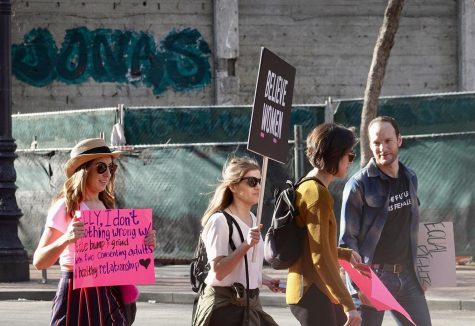Opinion: San Francisco’s District Attorney recall is a fear campaign
Although District Attorney Chesa Boudin has been in office for under two years, he has already become one of the most controversial political figures in San Francisco’s history. Critics of the district attorney claim that he has failed to keep our city safe by choosing to not prosecute dangerous criminals.
One hot button issue in connection with the recalls is the rising number of “smash-and-grab” car break-ins in San Francisco. However, according to the California Department of Justice, San Francisco property theft is at an all time low. So what is the real issue behind the recalls of Chesa Boudin? According to Boudin and his team, the recalls are politically motivated. “Recalls are not political tools for people who lose elections,” Boudin said in a statement released in response to the recall effort.
To date, there have been two campaigns made to recall Chesa Boudin as San Francisco district attorney. The first began on March 4 and was led by failed Republican mayoral candidate Richie Greenberg. Greenberg’s recall attempt was unsuccessful with only 49,600 of the required 51,325 signatures it needed by August 11 to put a recall on the ballet.
The second attempt began on April 28 and has a deadline of October 25 to collect the required 51,325 signatures. This campaign is led by Mary Jung and Andrea Shorter, two moderate democrats. “The way it’s been framed is there’s this ‘conservatives versus progressives’ thing going on, when in fact the inconvenient truth of the matter is no, it’s not that,” Andrea Shorter told the San Francisco Examiner.
Regardless of party affiliations, the motives are still clear: these recall efforts are merely an excuse to oust a progressive politician from office for challenging institutionalized racism and the prison industrial complex. The arguments that the recall efforts are based around are fundamentally flawed and are nothing more than fear campaigns with little basis in reality. “Since [Boudin] took office, burglaries, car break-ins, homicides and overdose-related deaths are at a crisis level,” claimed the second recall. However, burglaries have increased only 0.7 percent since this time last year according to the San Francisco Police Department’s statistics. And, overall property theft is at a record low. Motor vehicle theft is down almost two percent in the past year. In 2020, Boudin’s first year in office, assault, larceny-theft, rape and robbery all plummeted dramatically. Although, in that same time period burglaries, motor vehicle thefts and homicides saw an increase. However, the latter is still below the level that it was in 2017, the first year crime statistics are visible from the SFPD. Additionally, claims that homicides spiked in 2020 compared to 2019 are misleading, considering 2019 had the lowest homicide rate on the city’s record since 1963, with only 41 instances reported.
A main argument of the second recall, the one more openly supported by moderate democrats, is that Boudin refuses to take San Francisco’s drug crisis seriously. The true meaning is that Boudin refused to lock up anyone found in possession of a controlled substance for the maximum possible sentence. The more traditional “tough on crime” approach is one that has been favored by both Democrats and Republicans alike since the Nixon administration began the war on drugs. However, this approach has been proven time and time again not to work. Despite the war on drugs being waged for over 50 years, drug overdoses within the United States continue to rise dramatically. 2020 had the highest rate of overdose related deaths on record. So what has the war on drugs and tough on crime approaches brought us? Not lower crime rates or drug use, but the highest rate of incarceration in the world. Additionally, these policies have devastated low income communities, especially those of color. Decades of over policing and harsh sentences for minor offenses have led to broken families, ruined communities and destroyed lives. Now, a district attorney who refuses to continue those injustices and abate that cycle of institutional violence is at risk of being ousted from office for treating drug abuse for what it is: a public health emergency, not a crime.












